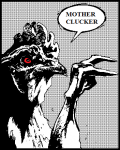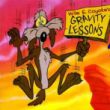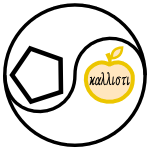Page 1 of 1
Pagans = taoists ?
#1

Posted 30 June 2008 - 06:55 PM
ARE WICCANS, AND PAGANS IN GENERAL, LATTER-DAY TAOISTS ?
Tao is a word full of meaning. It may mean âto speakâ or âto guideâ. It also means a way, both in the sense of a pathway and in the sense of a method.
In the broadest sense, the Way means âthe way things areâ, the source of this natural order, and the methods of harmonising with the vital spirit of the Way.
In the pure sense, the meaning of following the Tao, later called Taoism or Wayfaring, included the whole spectrum of the search for knowledge.
The Taoist wayfarers were heirs to several sources of most ancient knowledge; shamans who knew how to alter consciousness; curers who studied the properties of plants and minerals; diviners who studied the weather, the stars, the animals, and the balance of the environment; spontaneously evolved chieftains and courts of high antiquity who laid the groundwork of civilisation; scribes and historians, whose work confronted them daily with the lessons of the ages; so-called lost peoples, descendants of refugee colonies; special people known to others but living outside of society; and those transcendent few unknown to most but able to influence under certain conditions. Human myths and legends of lost people and immortality probably relate to individual seekers and groups who lived apart and were living the Way.
The roots of Taoism are very old. The oldest Taoist text is attributed to the Shang-Yin dynasty in the 18th century BC. Taoist works also belong to the time of the Chou dynasty in the 12th century BC. These early works were lost but the Book of Change [I Ching] composed during the Chou dynasty time is considered to be an ancestral Taoist text.
To place this in context, Confucius and at least one of the Old Taoist Masters [Lao-tzu] in China were more or less contemporary with Lord Buddha in India, Zoroaster in Persia, and Pythagoras in Greece â all followers of ancient knowledge traditions. Was there, in fact, a common root to all this ? Letâs not go there because that can lead to only one myth, legend â call it what you will.
The two essential philosophical classics of Taoism, âTao Te Chingâ and âChuang-tzuâ were written in the later days of the Chou dynasty â [1123 â 256 BC]
The Tao Te Ching was highly regarded by most Taoists while the Chuang-tzu appealed more to Taoist mysticism.
When Buddhism reached China in the early part of the first millennium, it co-existed with Confucian orthodoxy and Taoism, all seekers of the Way. By the 6th century AD, Taoism became the state religion of China.
So, how do we link this to Wicca and paganism ?
If we take the broad definition of âSeeker of the Wayâ, then this can be applied to all religions and philosophies, and maybe that this is all we need to show connection. The Way is physically endless, like Ourobouros swallowing itâs own tail and it is endlessly diverse. It lies with each individual to find their own Way.
But can we be a bit more precise than that ?
We need to go into Wiccan roots.
I think we can exclude Pagan from any further discussion as âPaganâ is derived from the Roman âpaganusâ which translates as country-dweller as opposed to âurbanusâ â city-dweller. By the 4th century AD pagan had come to mean heathen i.e. non-christian.
[Heathen is derived from Old English hoeden, Old Norse â heioinn]
In modern usage, we can take pagan as animist or nature worshipper [Gaian ?]
Witchcraft.
Earliest recorded reference to this practice occurs in the Code of Hammurabi [about 2000 BC, Babylonia] with an early version of the âDucking stoolâ for accused witches.
Old Testament is also condemning but more concerned with fraudulent claims of witchcraft as much as the actual practice.
Judaism links witchcraft with idolatry and necromancy âThou shalt not permit a witch to liveâ Exodus 22:18. The problem with witchcraft in Judaism is that it involves worshipping âother godsâ. In fact, some of the early Rabbis practiced magic themselves but this was put down as a miracle from God, not witchcraft.
Witchcraft appeared to be access to knowledge that the common person lacked. Going back to Taoist curers and diviners, we find the same description. Is this the root of so-called witchcraft and magic â just the application of well-established natural principles ?
Druids.
If you look at this one carefully Druid = Shamen. Druids acted a conservers of culture, lore and knowledge for their communities. Not only diviners and curers in the Taoist sense but also scribes and historians.
[getting quite excited now â I can see the connection clearly, hope you can too]
Finally, Wicca.
âWorshipping complementary polarities [ Yin and Yang ] and embodiments of a life-force manifest in nature. IN OTHER WORDS, THE WAY.
Thatâs it. You are all Taoists. You even have a written path, The Rede.
To conclude, from the Tao Te Ching [approx 600 BC]
â The Great Way is universal;
it can apply to the left or the right.
All beings depend on it for life,
And it does not refuse.
Its accomplishments fulfilled,
It does not dwell on them.
It lovingly nutures all beings,
But does not act as their ruler.
As it has no desire, it can be called small.
As all beings take to it,
Yet it does not act as their ruler,
It can be called great.
Therefore sages never contrive greatness;
that is why they can become so great.
Tao is a word full of meaning. It may mean âto speakâ or âto guideâ. It also means a way, both in the sense of a pathway and in the sense of a method.
In the broadest sense, the Way means âthe way things areâ, the source of this natural order, and the methods of harmonising with the vital spirit of the Way.
In the pure sense, the meaning of following the Tao, later called Taoism or Wayfaring, included the whole spectrum of the search for knowledge.
The Taoist wayfarers were heirs to several sources of most ancient knowledge; shamans who knew how to alter consciousness; curers who studied the properties of plants and minerals; diviners who studied the weather, the stars, the animals, and the balance of the environment; spontaneously evolved chieftains and courts of high antiquity who laid the groundwork of civilisation; scribes and historians, whose work confronted them daily with the lessons of the ages; so-called lost peoples, descendants of refugee colonies; special people known to others but living outside of society; and those transcendent few unknown to most but able to influence under certain conditions. Human myths and legends of lost people and immortality probably relate to individual seekers and groups who lived apart and were living the Way.
The roots of Taoism are very old. The oldest Taoist text is attributed to the Shang-Yin dynasty in the 18th century BC. Taoist works also belong to the time of the Chou dynasty in the 12th century BC. These early works were lost but the Book of Change [I Ching] composed during the Chou dynasty time is considered to be an ancestral Taoist text.
To place this in context, Confucius and at least one of the Old Taoist Masters [Lao-tzu] in China were more or less contemporary with Lord Buddha in India, Zoroaster in Persia, and Pythagoras in Greece â all followers of ancient knowledge traditions. Was there, in fact, a common root to all this ? Letâs not go there because that can lead to only one myth, legend â call it what you will.
The two essential philosophical classics of Taoism, âTao Te Chingâ and âChuang-tzuâ were written in the later days of the Chou dynasty â [1123 â 256 BC]
The Tao Te Ching was highly regarded by most Taoists while the Chuang-tzu appealed more to Taoist mysticism.
When Buddhism reached China in the early part of the first millennium, it co-existed with Confucian orthodoxy and Taoism, all seekers of the Way. By the 6th century AD, Taoism became the state religion of China.
So, how do we link this to Wicca and paganism ?
If we take the broad definition of âSeeker of the Wayâ, then this can be applied to all religions and philosophies, and maybe that this is all we need to show connection. The Way is physically endless, like Ourobouros swallowing itâs own tail and it is endlessly diverse. It lies with each individual to find their own Way.
But can we be a bit more precise than that ?
We need to go into Wiccan roots.
I think we can exclude Pagan from any further discussion as âPaganâ is derived from the Roman âpaganusâ which translates as country-dweller as opposed to âurbanusâ â city-dweller. By the 4th century AD pagan had come to mean heathen i.e. non-christian.
[Heathen is derived from Old English hoeden, Old Norse â heioinn]
In modern usage, we can take pagan as animist or nature worshipper [Gaian ?]
Witchcraft.
Earliest recorded reference to this practice occurs in the Code of Hammurabi [about 2000 BC, Babylonia] with an early version of the âDucking stoolâ for accused witches.
Old Testament is also condemning but more concerned with fraudulent claims of witchcraft as much as the actual practice.
Judaism links witchcraft with idolatry and necromancy âThou shalt not permit a witch to liveâ Exodus 22:18. The problem with witchcraft in Judaism is that it involves worshipping âother godsâ. In fact, some of the early Rabbis practiced magic themselves but this was put down as a miracle from God, not witchcraft.
Witchcraft appeared to be access to knowledge that the common person lacked. Going back to Taoist curers and diviners, we find the same description. Is this the root of so-called witchcraft and magic â just the application of well-established natural principles ?
Druids.
If you look at this one carefully Druid = Shamen. Druids acted a conservers of culture, lore and knowledge for their communities. Not only diviners and curers in the Taoist sense but also scribes and historians.
[getting quite excited now â I can see the connection clearly, hope you can too]
Finally, Wicca.
âWorshipping complementary polarities [ Yin and Yang ] and embodiments of a life-force manifest in nature. IN OTHER WORDS, THE WAY.
Thatâs it. You are all Taoists. You even have a written path, The Rede.
To conclude, from the Tao Te Ching [approx 600 BC]
â The Great Way is universal;
it can apply to the left or the right.
All beings depend on it for life,
And it does not refuse.
Its accomplishments fulfilled,
It does not dwell on them.
It lovingly nutures all beings,
But does not act as their ruler.
As it has no desire, it can be called small.
As all beings take to it,
Yet it does not act as their ruler,
It can be called great.
Therefore sages never contrive greatness;
that is why they can become so great.
#2

Posted 30 June 2008 - 07:29 PM
Odd how you're assuming that we're all pagans - we're mostly atheist, with the next biggest groups being Christian and Muslim, as far as I recall - but it's still interesting stuff if only as an example of coincidental development.
Hello, soldiers, look at your mage, now back to me, now back at your mage, now back to me. Sadly, he isnt me, but if he stopped being an unascended mortal and switched to Sole Spice, he could smell like hes me. Look down, back up, where are you? Youre in a warren with the High Mage your cadre mage could smell like. Whats in your hand, back at me. I have it, its an acorn with two gates to that realm you love. Look again, the acorn is now otataral. Anything is possible when your mage smells like Sole Spice and not a Bole brother. Im on a quorl.
#3

Posted 30 June 2008 - 07:49 PM
Nice post... but I think you are over-simplifying. For example:
The view that Indian religion = Buddhism is not quite right. Contemporaneous with the Buddha were eight other distinct systems of philosophy - some of them staunchly materialist - even atheist. Same goes for China (Taoism and Confucianism being simply the most dominant - not the only ones around), the Middle East, Persia, Greece (socrates/ plato vs Aristotle itself is a dissertation).
As a pagan myself (well an agnostic), I would resent being clubbed with wiccans or Thule mystics and so on.
In a nutshell - don't club em!
Quote
To place this in context, Confucius and at least one of the Old Taoist Masters [Lao-tzu] in China were more or less contemporary with Lord Buddha in India, Zoroaster in Persia, and Pythagoras in Greece â all followers of ancient knowledge traditions. Was there, in fact, a common root to all this ? Letâs not go there because that can lead to only one myth, legend â call it what you will.
The view that Indian religion = Buddhism is not quite right. Contemporaneous with the Buddha were eight other distinct systems of philosophy - some of them staunchly materialist - even atheist. Same goes for China (Taoism and Confucianism being simply the most dominant - not the only ones around), the Middle East, Persia, Greece (socrates/ plato vs Aristotle itself is a dissertation).
As a pagan myself (well an agnostic), I would resent being clubbed with wiccans or Thule mystics and so on.
In a nutshell - don't club em!
Forum Member from the Old Days. Alive, but mostly inactive/ occasionally lurking
#4

Posted 30 June 2008 - 09:18 PM
"assuming we are all pagans" - thats just your assumption.
"over-simplifying" "dont club them" Taoism is about Seekers of Knowledge - a definition which fits all philosophies, doesn't it ?
"over-simplifying" "dont club them" Taoism is about Seekers of Knowledge - a definition which fits all philosophies, doesn't it ?
#5

Posted 01 July 2008 - 12:12 AM
The purpose of a group is to identify it's members as distinct from non members. By saying everyone is a taoist you remove the significance of the name.
Also, that post was obviously not directed at us, why did you post it here?
Also, that post was obviously not directed at us, why did you post it here?
#6

Posted 01 July 2008 - 07:04 AM
Quite right. I originally posted it on pagan/wiccan site that I belong too. My first posting here and it was noticed wasn't it. Just an announcement of presence.
Incidently, regarding the other posting I made, Jedi are also Taoists obviously.
Incidently, regarding the other posting I made, Jedi are also Taoists obviously.
#8

Posted 01 July 2008 - 03:09 PM
I do apologise to all. I have a rather childish sense of humour. Taught too many under-grads. I suppose.
#9

Posted 01 July 2008 - 03:10 PM
Hey, not all undergrads are children...
The President (2012) said:
Please proceed, Governor.
Chris Christie (2016) said:
There it is.
Elizabeth Warren (2020) said:
And no, Im not talking about Donald Trump. Im talking about Mayor Bloomberg.
#10

Posted 01 July 2008 - 06:08 PM
Can you prove that ?  Maybe had too much sugar today [ or too little medication ]
Maybe had too much sugar today [ or too little medication ]
#11

Posted 01 July 2008 - 06:58 PM
Well, I'm a 30-yo undergrad.  But I will admit to being surrounded by children...
But I will admit to being surrounded by children...
The President (2012) said:
Please proceed, Governor.
Chris Christie (2016) said:
There it is.
Elizabeth Warren (2020) said:
And no, Im not talking about Donald Trump. Im talking about Mayor Bloomberg.
#12

Posted 01 July 2008 - 11:17 PM
I'm a grad, pleased to meet you.
God that's been a long time coming.
God that's been a long time coming.
#13

Posted 02 July 2008 - 08:23 AM
I'll be a grad soon enough...but then I have grad school for years and years....
The President (2012) said:
Please proceed, Governor.
Chris Christie (2016) said:
There it is.
Elizabeth Warren (2020) said:
And no, Im not talking about Donald Trump. Im talking about Mayor Bloomberg.
#14

Posted 02 July 2008 - 10:34 AM
I'm a grad, and quite the child.
Error: Signature not valid
#15

Posted 02 July 2008 - 03:31 PM
Actually, I do miss my under-grads since retirement, they were from all over the E.U. and they kept me young in attitude. 
#16

Posted 02 July 2008 - 07:11 PM
Just an aside- I misread this thread title (I left my glasses at home today by accident) as "Pagans = rapists?"
Needless to say I was intrigued.
Needless to say I was intrigued.
<!--quoteo(post=462161:date=Nov 1 2008, 06:13 PM:name=Aptorian)--><div class='quotetop'>QUOTE (Aptorian @ Nov 1 2008, 06:13 PM) <a href="index.php?act=findpost&pid=462161"><{POST_SNAPBACK}></a></div><div class='quotemain'><!--quotec-->God damn. Mighty drunk. Must ... what is the english movement movement movement for drunk... with out you seemimg drunk?
bla bla bla
Peopleare harrasing me... grrrrrh.
Also people with big noses aren't jews, they're just french
EDIT: We has editted so mucj that5 we're not quite sure... also, leave britney alone.<!--QuoteEnd--></div><!--QuoteEEnd-->
bla bla bla
Peopleare harrasing me... grrrrrh.
Also people with big noses aren't jews, they're just french
EDIT: We has editted so mucj that5 we're not quite sure... also, leave britney alone.<!--QuoteEnd--></div><!--QuoteEEnd-->
#18

Posted 16 June 2015 - 03:11 AM
Not quite. Pagan/Wicca comes from Celtic Magick via Western Hermeticism, which comes from the pre-Abrahamic practices of the Greek and Egyptian mystery schools. They share a lot of principles because all esoteric philosophies share a lot of principles - it's been said that 'esoteric philosophy is that place where all exoteric differences dissolve'. While they share ontic principles, like the mental nature of reality, they diverge sharply on epistemology. Wiccans/Pagans believe their paradigms are True; a Taoist believes all paradigms are False. Hence the Taoist maxim "The Tao that can be named is not the eternal Tao". The closest thing to Taoism is Zen, and in the West, Discordianism. The Tao also has some parallels in Qabalah - Ain Soph Aur is roughly equivalent.
This post has been edited by SwiftBenjamin: 16 June 2015 - 03:12 AM
Nemo saltat sobrius.
Share this topic:
Page 1 of 1

 Help
Help















